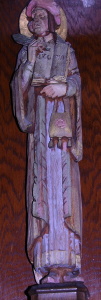 Thomas More (February 7, 1478 – July 6, 1535) was an English lawyer, scholar, author and statesman. During his life he gained a reputation as a leading Renaissance humanist, an opponent of the Reformation of Martin Luther and a government official. For the last six years of his life he was Lord Chancellor. More coined the word “utopia”—a name he gave to the ideal, imaginary island nation whose political system he described in Utopia, published in 1516. An important counselor to Henry VIII of England, he was imprisoned and executed by beheading in 1535 after he had fallen out of favor with the king over his refusal to sign the Act of Supremacy 1534, which declared the King the supreme head of the Church of England, effecting a final split with the Catholic Church in Rome. Four hundred years after More’s death, Pope Pius XI canonized him in 1935. More was declared patron saint of politicians and statesmen by Pope John Paul II in 2000. In 1969, More’s name was included in the General Roman Calendar, with a memorial in which he is venerated with John Fisher on June 22, the day of Fisher’s death. In 1980, More was added to the Church of England’s calendar of saints, again jointly with John Fisher, but on July 6, the day of More’s death. Thomas More greatly valued harmony and a strict hierarchy. The greatest danger to the health of the society as he saw it was the challenge that heretics posed to the established faith. For More, the unity of Christendom was not only the instrument for the eternal salvation of souls, but also the basis of a common understanding of human nature necessary for just law and earthly happiness. To his mind, the fragmentation and discord of the Lutheran Reformation were dreadful. In 1530 More refused to sign a letter by the leading English churchmen and aristocrats asking the pope to annul Henry’s marriage to Catherine; he also quarreled with Henry VIII over the heresy laws. The last straw for Henry came in 1533, when More refused to attend the coronation of Anne Boleyn as the Queen of England. Technically, this was not an act of treason as More had written to Henry acknowledging Anne’s queenship and expressing his desire for the king’s happiness and the new queen’s health. However, his refusal to attend the coronation was widely interpreted as a snub against Anne, and Thomas More was beheaded as a consequence.
Thomas More (February 7, 1478 – July 6, 1535) was an English lawyer, scholar, author and statesman. During his life he gained a reputation as a leading Renaissance humanist, an opponent of the Reformation of Martin Luther and a government official. For the last six years of his life he was Lord Chancellor. More coined the word “utopia”—a name he gave to the ideal, imaginary island nation whose political system he described in Utopia, published in 1516. An important counselor to Henry VIII of England, he was imprisoned and executed by beheading in 1535 after he had fallen out of favor with the king over his refusal to sign the Act of Supremacy 1534, which declared the King the supreme head of the Church of England, effecting a final split with the Catholic Church in Rome. Four hundred years after More’s death, Pope Pius XI canonized him in 1935. More was declared patron saint of politicians and statesmen by Pope John Paul II in 2000. In 1969, More’s name was included in the General Roman Calendar, with a memorial in which he is venerated with John Fisher on June 22, the day of Fisher’s death. In 1980, More was added to the Church of England’s calendar of saints, again jointly with John Fisher, but on July 6, the day of More’s death. Thomas More greatly valued harmony and a strict hierarchy. The greatest danger to the health of the society as he saw it was the challenge that heretics posed to the established faith. For More, the unity of Christendom was not only the instrument for the eternal salvation of souls, but also the basis of a common understanding of human nature necessary for just law and earthly happiness. To his mind, the fragmentation and discord of the Lutheran Reformation were dreadful. In 1530 More refused to sign a letter by the leading English churchmen and aristocrats asking the pope to annul Henry’s marriage to Catherine; he also quarreled with Henry VIII over the heresy laws. The last straw for Henry came in 1533, when More refused to attend the coronation of Anne Boleyn as the Queen of England. Technically, this was not an act of treason as More had written to Henry acknowledging Anne’s queenship and expressing his desire for the king’s happiness and the new queen’s health. However, his refusal to attend the coronation was widely interpreted as a snub against Anne, and Thomas More was beheaded as a consequence.
< Back to History of the Reredos Next St. John Fisher>
